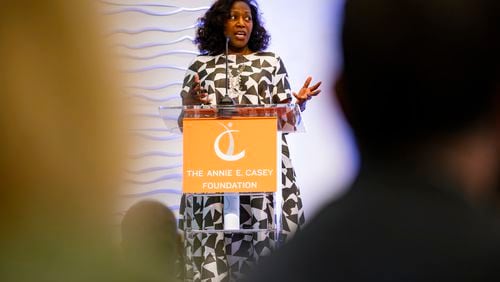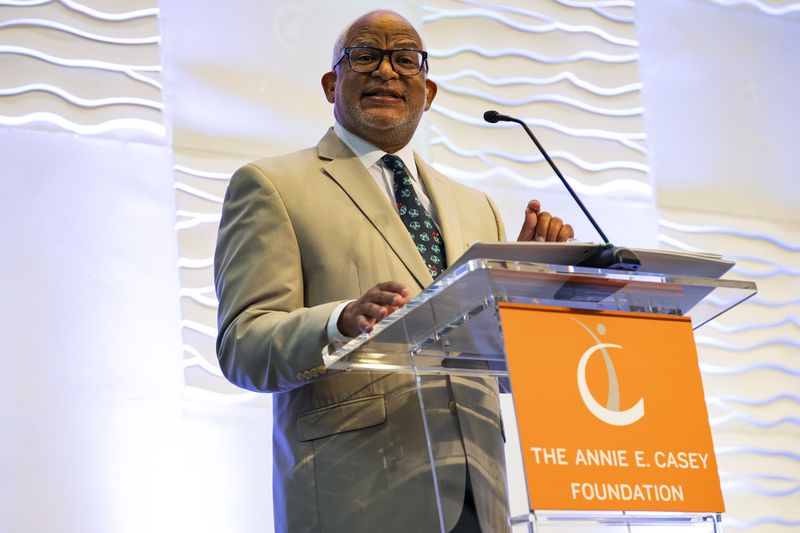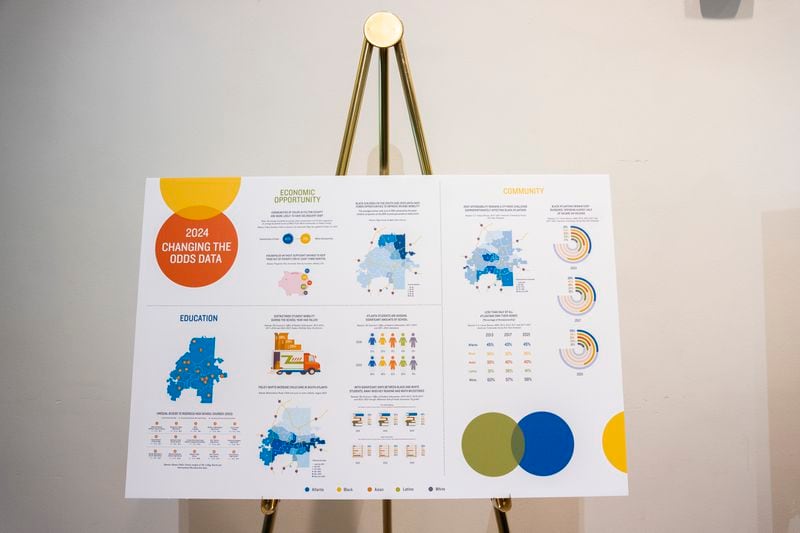There are a few things people need in order to live good lives. Young people need quality education, parents need jobs and people need safe, quality and affordable housing, the Annie E. Casey Foundation argues.
But in Atlanta, too often those opportunities are not evenly distributed, the foundation says. Despite employment gains, income increases and a decreased rate of children in poor areas, the financial and educational gaps between Black and white Atlantans are still growing, according to the Foundation’s new report, “Changing the Odds: Comprehensive Solutions for Atlanta’s Future.”
The authors analyzed U.S. Census surveys as well as local and state education data to look at the city’s racial disparities, particularly after the pandemic and the protests spurred by the murder of George Floyd. The report builds on the findings from two previous editions in 2015 and 2019, which highlighted similar racial inequalities.
But progress has been made and people in the community are resilient, according to Kweku Forstall, director of the foundation’s Atlanta Civic Site.
“They make a way out of no way, but what we want them to do is not have to do that,” Forstall told The Atlanta Journal-Constitution. “We want to change the odds, so they don’t have to beat the odds.”
Credit: Olivia Bowdoin
Credit: Olivia Bowdoin
Uneven growth
Atlanta has the second-lowest economic mobility numbers in the country because of disparities in income, savings and debt, according to the report.
Median household incomes for all racial groups in Atlanta increased from 2013 to 2021, but it grew more gradually for Black residents. Despite the increased incomes, the gap between Black and white households widened from about $72,000 in 2013 to more than $75,000 in 2021.
At the same time, the Black unemployment rate decreased to historic lows, from 21% in 2013 to just 9% in 2021. That rate is still three times higher than that for white Atlantans.
This shows employment by itself is not a proxy for wealth accumulation, according to Ade Oguntoye, a senior associate at the Foundation’s Atlanta Civic Site.
“We cannot just think about getting people any jobs without the consideration of overall job quality. Good jobs include living wage salaries, wage progression and benefits like health insurance along with other factors like stable housing,” Oguntoye said Thursday at an event unveiling the report.
Progress made, then undone
Some progress on child poverty has been made, according to the foundation’s report. In 2012, less than a quarter of the city’s Black children lived in areas of the city with low rates of poverty. In 2021, 35% of Black children were in low-poverty areas.
However, white and Asian children are more than twice as likely to live in low-poverty areas. Fewer Latino children lived in low-poverty areas in 2021 compared to 2012.
Interventions during the pandemic worked to dramatically reduce the child poverty rate, researchers found. In Atlanta, 10,000 children temporarily were classified as out of poverty because of the expanded federal child tax credit. More families were able to stay in their homes because of emergency assistance and eviction moratoria that were put in place to ease the pandemic’s economic challenges.
But when the expanded tax credit expired, child poverty rates bounced back, in part because Georgia does not offer a state-funded child tax credit or earned income tax credit, the report’s authors said.
Credit: Olivia Bowdoin
Credit: Olivia Bowdoin
And after the pandemic eviction pauses, the number of eviction filings rebounded to pre-pandemic levels. The report found housing affordability and rent increases disproportionately affect Black Atlantans — only 35% of Black residents in the city own their homes compared to 58% of white residents.
In education, significant progress has been made with high school graduation rates, which increased across all racial groups. The graduation gaps between white students and Black and Latino students decreased by 15 and 16 percentage points from 2014 to 2023, respectively.
But there are major disparities in key reading and math milestones among the city’s young students that could jeopardize future progress. In 2023, just 21% of Black third graders and 35% of Latino students were proficient or above in reading compared to 81% of white third graders. And among eighth graders, just 15% of Black students and 25% of Latinos were proficient or above in math milestones compared to 74% of their white peers.
Potential solutions
The disparities highlighted in the report are issues Atlanta has been facing for decades and it will take a collaboration of community, nonprofit, business and government leaders to change outcomes, according to the report.
“No one intervention can undo what has been done systemically and generationally,” Oguntoye said. “We know we must lean into our individual work to bring about change, but for systemic change to take hold, we must do so collectively.”
The progress that has been made shows there are solutions that can work, Forstall said, like the pandemic-era interventions.
The foundation listed 10 recommendations to address the issues raised in the report, including extending renter safety net policies, bolstering homeowner stability in part by easing the costs of tax hikes and home repairs, increasing access to quality early education and adopting a state child tax credit.
The Atlanta Journal-Constitution and Report for America are partnering to add more journalists to cover topics important to our community. Please help us fund this important work here.
About the Author









